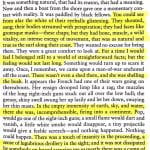This page represents the isolation Marlow feels, in being the only one who has not fallen prey to the idealistic conception of colonialism, and knows it for what it truly is. His “isolation amongst all these men” with whom he felt no common ground, as well as the “uniform sombreness of the coast”, kept him in some sort of facade, almost wanting to drive him mad. The African coast looking so sombre, yet so inviting, shows the uncertainty and enigma around the journey that is faced by Marlow. Marlow seems to represent the idea that the advent of colonialism is something that is inviting when you are apart from it, but it is something cruel and horrific in nature once you become a part of it. The uniformity of the men on his ship, as accompanied by the way in which the coast looks, communicates a sense of normality that is far from the truth of colonialism, as Marlow discovers in the succeeding pages when he reaches his destination. Marlow recognises the sound of the waves as something that “had reason, had a meaning”; he understands why the waves make those noises, and that there is a reason for that. This is juxtaposed against the sombreness of the coast, to show the uncertainty and preoccupations facing his journey to the African coast.
When Marlow sees the African men rowing the boat down the coast, he does something rather surprising and out of character for him, in that he humanises them as a comparison to the men he is on the boat with. His crew mates lack uniqueness in that they are all motivated by a single desire; that of greed, masked by the lies of civility, and this has dehumanised them to the point of generalisation where Marlow uses his disconnection with them to represent his disconnection from the rest of society. While his description of the men holds racist connotations, such as their “grotesque masks”, he notices their “wild vitality” and “an intense energy of movement, that was as natural and true as the surf along their coast”. Their presence, just like the waves in the ocean, can be explained with reason; simply because this is where they are from, and this is their home. It is once again used to show how unnatural the white men venturing into this foreign territory seems; unlike the African men on the boat, there is nothing about them to signify a sense of purpose about their African ventures.
Marlow and these men have come to Africa to know the unknown, but Africa resist being known. The man-of-war that fires into absolute nothingness shows Africa’s resistance at being known, and drives those who try absolutely crazy. Marlow makes note of the “incomprehensible” nature of the ship firing into a continent, after which “nothing could happen”. He sees this as a “touch of insanity in the proceeding, a sense of lugubrious drollery in the sight”. Likewise, one of the men of his ship attempt to assure him that there are in fact native “enemies” hiding out in the woods somewhere, trying to justify the man-of-war’s actions. It once again shows the illusion created by the Westerners themselves; they believe the black man is their enemy, when in fact the desires created by their own greed that ultimately drive them insane are their true enemies. It shows a unity of civilisation, in the sense that Marlow is a part of this civilisation who are all so insanely misdirected in their representation of the Africans as enemies. They fail to see that the horrors of colonialism are caused by themselves, and the inability for the white man to see this, regardless of whether he is French or British, shows a common sentiment being echoed by Marlow; the idea that the true desires of colonial practices are hidden by the illusion of fighting the enemies of civilisation.


